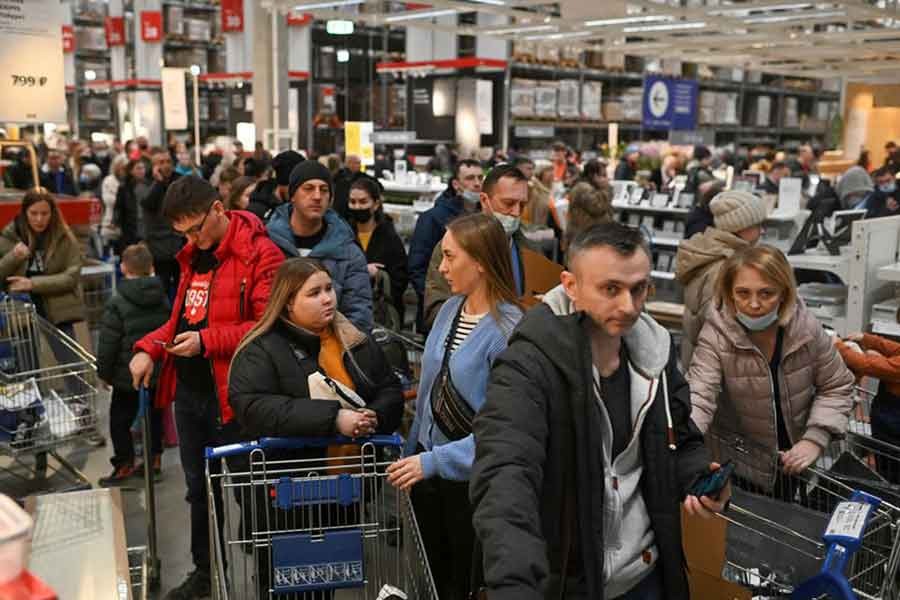Companies and investors across the world faced Russian dilemmas on Friday as they weighed up an offer from Moscow to fast-track their exits from the country and allow them to hand over holdings to local managers until they return.
The options offered by First Deputy Prime Minister Andrei Belousov came one week since Russia's invasion of Ukraine and a day after French bank Societe Generale warned that it could be stripped of its Russian operations, which sent a chill through companies seeking to stay put in the country.
Belousov outlined three alternatives for foreign firms.
"The company continues to work fully in Russia," he said in a statement. "Foreign shareholders transfer their share to be managed by Russian partners and can return to the market later," he added, and: "The company permanently terminates operations in Russia, closes production and dismisses employees."
According to Reuters, no route comes without risks. Those staying on could face a backlash in Western markets where the public have rallied to Ukraine's cause, those transferring shares could be handing over the keys with few guarantees, while those quitting may face a big loss at best, or might have to sell for a nominal sum.
Russia's invasion has prompted the United States and Europe to impose sweeping sanctions, affecting everything from global payments systems to a range of hi-tech products, which make doing business in Russia increasingly complex and precarious.
For ordinary Russians, it means deep economic pain.
Some multinationals such as energy majors BP and Shell have already said they are quitting, while others have held off signing off from Russia for now. TotalEnergies has said it would stay but would not invest more.
IKEA announced plans to close stores on Thursday but said it would pay its 15,000 Russian staff for at least three months.
NO EASY FIXES
Italian tyre maker Pirelli said on Friday it was constantly monitoring developments through a specially constituted "crisis committee", adding it did not expect to halt either of its two Russian plants.
Its rival, Finland's Nokian Tyres, said last week it was shifting production of some product lines out of Russia.
But there are no easy fixes even for those looking for the exit when there are limited trading counterparties.
British insurer and asset manager Royal London said it planned to sell its Russian assets, which it said only accounted for about 0.1 per cent of its portfolio.
"We can't trade these things anyway, but as soon as we can, we obviously intend to divest," Chief Executive Barry O'Dwyer said.
For those seeking the door, the Russian first deputy prime minister said a fast-track bankruptcy plan "will support the employment and social well-being of citizens so that bona fide entrepreneurs can ensure the effective functioning of business".
Many companies are still trying to count the cost of their exposure to Russia, a figure that for many keeps changing with each new round of sanctions announced by the United States, the European Union and Britain.
So far global companies, banks and investors have announced that they have exposure in some form to Russia of more than $110 billion. That number could rise. Data from research firm Morningstar, meanwhile, shows exposure from international funds to the tune of $60 billion in stocks and bonds.
Norway's sovereign wealth fund, the world's largest, said on Thursday it has written the value off the roughly $3 billion in assets it held in Russia.
'EXTREME SCENARIO'
Meanwhile, SocGen, which has a $20 billion exposure to Russia, said on Thursday it had an adequate buffer for an "extreme scenario, in which the group would be stripped of property rights to its banking assets in Russia".
Dutch bank ING provided an update on Friday on its exposure to Russia and Ukraine, saying about 700 million euros ($770 million) in outstanding loans were affected by "new sanctions on (Russian) specific entities and individuals".
BASF, the world's largest chemicals group, said it was halting new business in Russia and Belarus, except for those related to food production as part of humanitarian measures.
But BASF also pointed to challenges companies now face in navigating a way through a minefield of sanctions.
"Effective immediately, BASF will only conduct business in Russia and Belarus that fulfils existing obligations in accordance with applicable laws, regulations and international rules," the German chemical maker said.
Swiss watchmaker Swatch Group said it would continue its operations in Russia but was putting exports on hold "because of the overall difficult situation."
Deutsche Bank said it had been stress-testing its operations given it has a big technology centre in Russia but said it was assured of its ability to run its everyday business globally.
The German lender had opened a new office in Moscow in December, a move it said at the time represented "a significant investment and commitment to the Russian market".


